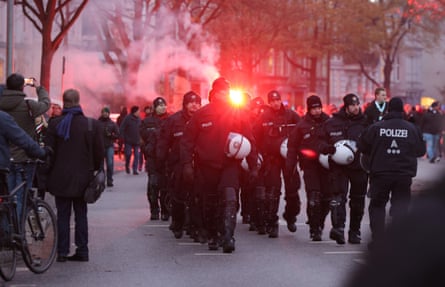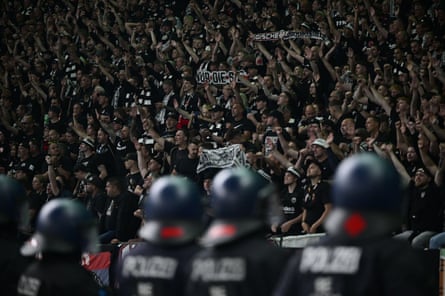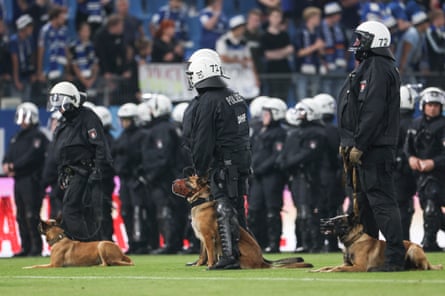Before the Euro 2024 group stage draw in Hamburg this month, numerous banners appeared across the city, protesting against next summer’s tournament in Germany with one saying: “Also in the hat for today’s draw: police violence”.
To those who associate German football with a vibrant fan culture and a generally lenient approach to match-day policing, that may come as a surprise. However, with six months to go until the European Championship, the relationship between fans and police is deteriorating dramatically.
On 25 November at least 200 fans, police officers and stewards were injured in serious violence outside Eintracht Frankfurt’s Waldstadion. After an alleged altercation between fans and stewards, police were attacked with bottles, metal barriers and pyrotechnics. They responded with repeated baton charges as well as pepper spray and teargas.
Two weeks earlier, similar scenes had marred the 2. Bundesliga fixture between St Pauli and Hannover 96, when riot police stormed into the away end wielding batons – ostensibly to break up a dispute between fans – before other units fired pepper spray indiscriminately through the fence. At least 32 people were injured.
Two months earlier I witnessed first-hand how police fired pepper spray into the away end in Frankfurt, resulting in dozens of Cologne fans spending the first half in the toilets attempting to wash their eyes out, whether they had been involved in alleged attempts to storm the turnstiles or not.
Perhaps most concerningly, on the opening day of the season, a live round of ammunition was discharged from a police firearm into an empty Borussia Mönchengladbach supporters’ bus in Augsburg. The police say the discharge occurred accidentally during the game while officers were “spraying each other with water due to the hot temperatures”. No one was injured but fans and local politicians have questioned why the specialist Bavarian USK unit was even deployed at such a low-risk fixture, but say authorities are stonewalling.

As for who is to blame for the current situation, it depends who you ask. “We have noticed in recent months that some fans alter their behaviour in the presence of the police, reject dialogue and resort to violence,” says Jochen Kopelke, chairman of the German Police Union. “Simple instructions are not followed, leading to violent attacks on police. The violence is terrifying and not to be trivialised.”
Indeed, the 2. Bundesliga fixture between Hansa Rostock and Schalke on Sunday was interrupted for 30 minutes after Schalke hooligans used a hammer to smash down a piece of plexiglass dividing home and away fans, before goading their Rostock counterparts.
“We should always take responsibility and not deny there is potential for violence among some problematic fan groups,” says Dario Minden from the nationwide supporter alliance, Unsere Kurve. “But it’s a multifaceted problem to which there are no simple solutions. Unfortunately, you often feel as a fan the police are part of the problem and not the solution.”

René Lau, a Berlin-based lawyer who specialises in defending football supporters, is convinced police are flexing their muscles before Euro 2024. “Rather than remaining largely outside the stadium as they used to do, the police are increasingly positioning themselves in full riot gear directly outside fan blocks,” he says. “The same thing happened before the 2006 World Cup [in Germany]. It’s a show of strength as if to say: we’re here, don’t mess with us.”
The confrontations are not just playing out in and around stadiums; police and fans have also used social media to promote their versions of events. Here again, contradictions abound.
In Frankfurt in November, police initially said they were breaking up clashes with visiting Stuttgart fans, a claim revised to absolve those fans of any involvement and that Frankfurt fans had attacked stewards who had tried to apprehend ticketless fans.
after newsletter promotion
Accounts from fan groups corroborated the revised version but while the police claimed that their officers were merely “defending themselves using basic physicality, pepper spray and batons”, fans described half an hour of “repeated attacks with batons and teargas with no regard for uninvolved fans, women and children”.
After an internal investigation, Eintracht criticised a police operation “the length and intensity of which has never taken place before” and called for a “detailed and self-critical analysis of the whole operation and the methods used”.
Fan groups have called for a ban on the use of pepper spray in stadiums, which, according to the police’s own statistics, injures substantially more people than, for example, pyrotechnics, including many police officers themselves. Its use is banned by Fifa.

After its use against Hannover fans in Hamburg earlier in November in what local legal-aid groups called “an orgy of violence”, the host club, St Pauli, said pepper spray risks “injuring uninvolved people and begs the urgent question of proportionality”.
Kopelke still insists the police see “no problem” in its “justified” deployment, while criticising fans for refusing to enter into dialogue. “The ultras prefer to communicate via defamatory banners and chants,” he says.
But Lau puts the ball in the police’s court, saying: “Fans are fans and clubs are clubs. The police, with its monopoly on the use of force, is the only actor here which has the possibility to de-escalate.”
The hope is that there will be de‑escalation – and not further escalation – before Euro 2024, a tournament organisers hope will be a celebration of football. For that to happen, fans and police would be well advised to take a step back.

